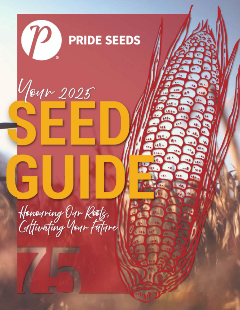Browse our selection of products below
___________________________________________________________________________________________________________________________________________

2024-2025 PRIDE Seeds Product GuideYou can find all of our products on the website, including supporting performance data and create your own personalized guide called My Guide. You can also download the digital version of our printed product guide which includes product comparison charts. |
Enhance your knowledge and stay ahead with PRIDE SEEDS Corn and Soybean School videos.
SHOP THE PRIDE SEEDS E-STORE
-7.png?sfvrsn=87920db3_3)
STAY UP-TO-DATE WITH PRIDE SEEDS LATEST BLOGS, NEWS AND ARTICLES
Ear Flex
Getting your corn planting population dialed in is essential when optimizing yield and profit. Ear type is an important agronomic trait to consider when optimizing planting population.

Breeding hybrids with increased yield and stronger agronomic performance provides farmers the solid one-two punch farmers need to continue to push record-breaking corn yields in both the grain corn and silage corn markets.
One breeding advancement has been the transition to using different hybrids in different situations based on ear type. Several producers in the market have shifted to using a ‘fixed ear’ corn hybrid as opposed to ‘flex ear’ or ‘semi-flex ear’ hybrids.
Fixed (or determinate) ear corn hybrids produce a strong, consistent ear size throughout a differing range of plant populations. These hybrids have very little response to the decreasing distance between plants and can be planted between 28,000 and 38,000 seeds per acre, while still producing a consistent ear size.
Breeders made this possible by creating hybrids that require a smaller root mass that retrieves water and nutrients, an upright leaf structure that allows photosynthesis to occur more rapidly with less leaf mass and a slender talk that still has acceptable standability. The ultimate goal with a fixed ear hybrid is to increase the total number of consistent ears across a field, thereby raising yield potential while using the same number of acres of land.
By contrast, flex ear (or indeterminate) hybrids, as the name suggests, flex out to react and respond to differing plant populations. Flex ear hybrids typically produce longer ears or larger diameter ears when planting populations are lowered. Yields with flex ear hybrids are optimized when planting populations are between 28,000 and 32,000 plants per acre.
By decreasing planting population, hybrids can take advantage of extra sunlight, nutrients and water to produce a larger cob. Since flex ear hybrids take advantage of extra room and sunlight, etc., the composition of its plant structure is different than that of a fixed ear hybrid. Flex ear hybrids tend to have more nodes and leaf mass above the ear. They also have slightly larger stalks, and depending on fertility root mass, can be larger as well.
When comparing fixed to flex ear characteristics, it’s important to know which hybrid works best in different growing situations. Both types have the potential to deliver higher yields when placed in the proper situation.
 Fixed ear hybrids with slender stalks, upright leaves and dense root structures allow producers to maximize grain production on a per acre basis. These characteristics help with trash management and increase the rate of canopy closer.
Fixed ear hybrids with slender stalks, upright leaves and dense root structures allow producers to maximize grain production on a per acre basis. These characteristics help with trash management and increase the rate of canopy closer.
Slender stalks of fixed ear hybrids can be easily worked into the field and have faster decomposition. An increase in canopy closer decreases light interception for weeds trying to grow, aiding in weed management; a crucial factor for growing high-yielding, profitable corn.
Flex ear hybrids give growers the option to make their seed go further, taking advantage of increased light penetration, nutrient uptake and raising the potential to gain additional rows of kernels. With flex ear hybrids you often see increased drought tolerance due to the plant having a larger root mass and better water retention. An additional advantage of a flex ear, that may not be noticeable, is that it has the potential to compensate during planting errors or seedling mortality. In a flex ear scenario, a deeper kernel can also be seen, which can result in higher test weights in grain corn and higher starch in silage corn.
It is important to understand how these different characteristics fit in with different on-farm management practices. The need for on-farm trialing cannot be understated and will help you understand how adjusting populations can increase yield on your farm.
Talk to your local PRIDE Seeds representative about any questions you may have. They are here to help you make the most of the yield potential on your farms!
TAKE PRIDE IN YOUR INBOX
Expert advice, news and information
THE PRIDE SEEDS ADVANTAGE
Farming is one of the most demanding industries in the world, subject to a variety of factors such as time, weather, and global pressures. You know this every time you look out the window and think about the field in front of you. Growers and dealers deserve an advantage: The PRIDE Seed Advantage.
LEARN MORETHE PRIDE SEEDS ADVANTAGE
Every year PRIDE Seeds works hard to produce leading-edge products that enable success where it matters most, on your farm. Our dedicated team strives to provide sales expertise, agronomy support, quality production, and service tailored to meet your needs.
LEARN MORE

Leave a commentOrder by
Newest on top Oldest on top